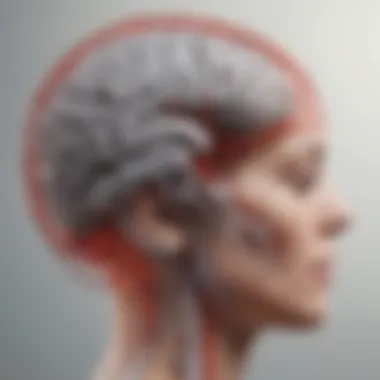Unveiling the Intricate Link Between Alcohol Consumption and Anxiety


This article explores the complex interplay between alcohol consumption and anxiety, delving deep into how excessive drinking can heighten symptoms of anxiety. By examining the neurological and psychological processes underlying alcohol-induced anxiety, readers will gain valuable insights into potential coping mechanisms and harm-reduction strategies. The narrative unfolds gradually, dissecting the topic step by step to provide a comprehensive understanding of the connection between alcohol and anxiety.
Neurological and Psychological Mechanisms of Alcohol-Related Anxiety
Navigating through the intricate web of neurological and psychological mechanisms involved in alcohol-related anxiety, we uncover the impact of alcohol on the brain and emotions. Detailed analysis offers a glimpse into how alcohol can disrupt neurotransmitter systems, affecting mood regulation and triggering anxiety symptoms. By shedding light on these intricate processes, readers can grasp the underlying reasons behind the exacerbation of anxiety in the presence of alcohol.
The Dopaminergic Pathways
Delving into the intricate pathways of dopamine within the brain, we unravel the role of this neurotransmitter in alcohol-induced anxiety. By exploring how alcohol alters dopamine levels and receptor sensitivity, we paint a vivid picture of how these changes intertwine with anxiety pathways. This section provides a detailed breakdown of the cascading effects of alcohol on the dopaminergic system, highlighting its contribution to anxiety manifestation.
Coping Strategies and Harm-Reduction Approaches
Incorporating a practical lens, this segment focuses on equipping readers with effective coping strategies and harm-reduction approaches to mitigate alcohol-related anxiety. By offering evidence-based tips and techniques, readers can navigate through challenges and seek support when needed. From mindfulness practices to professional interventions, this section acts as a guiding light for individuals looking to manage anxiety within the context of alcohol consumption.
Mindfulness and Meditation Techniques
Drawing from ancient practices, we explore how mindfulness and meditation can serve as powerful tools in alleviating anxiety symptoms exacerbated by alcohol. By elucidating the mindfulness strategies and breathing exercises, readers are empowered to cultivate a sense of presence and calm amidst turmoil. This subsection delves into practical steps that anyone can incorporate into their daily routine to foster emotional well-being and resilience.
Overall, this article serves as a beacon of knowledge, shining a light on the intricate relationship between alcohol and anxiety. Through detailed exploration and insightful analysis, readers are equipped with the understanding and tools needed to navigate this complex interplay with wisdom and clarity.
Introduction
The entry point into the complex web of alcohol and anxiety, the introduction sets the stage for a deep dive into how these two elements intertwine. Delving past surface perceptions, this section focuses on laying a strong foundation for understanding the nuances of their relationship. By highlighting their interconnectedness, the article aims to shed light on the impact of alcohol consumption on anxiety levels, unveiling the layers that contribute to this intricate dynamic. Emphasizing the importance of this topic in uncovering potential coping mechanisms and harm-reduction strategies, the introduction serves as a vital roadmap for readers seeking to grasp the intricate link between alcohol and anxiety.
Defining Alcohol Related Anxiety
Exploring the Intersection of Alcohol and Anxiety
Impacts of Alcohol on Mental Health
In parallel, it is crucial to examine the direct impacts of alcohol on mental well-being. By honing in on the intersection of alcohol and mental health, this section elucidates the profound effects that alcohol consumption can have on anxiety levels. Detailing how alcohol alters neurotransmitter functions and influences emotional regulation, this exploration underscores the intricate relationship between substance misuse and mental health struggles. By fleshing out these impacts, readers gain a more comprehensive understanding of the challenges posed by alcohol-related anxiety, setting the stage for subsequent discussions on coping strategies and interventions.
Scope of the Issue


Prevalence of Anxiety Disorders
To grasp the scope of the issue surrounding alcohol-related anxiety, it is imperative to first consider the prevalence of anxiety disorders in the general populace. By delving into statistical data and prevalence rates, this section provides a concrete foundation for understanding the widespread nature of anxiety-related concerns. Unpacking the prevalence of anxiety disorders not only contextualizes the significance of this issue but also underscores the urgent need for effective interventions and support systems. By shining a light on the prevalence of anxiety disorders, this segment enriches the overall discourse on alcohol-related anxiety, setting the stage for informed and proactive discussions.
Statistics on Alcohol Use and Anxiety
In tandem with exploring anxiety prevalence, it is equally critical to examine the statistics on alcohol use and its intersection with anxiety. By presenting empirical data on alcohol consumption patterns and their correlation with anxiety levels, readers gain valuable insights into the scope and scale of this multifaceted issue. Highlighting key statistics and trends, this section bolsters the narrative on alcohol-related anxiety, underlining the urgency of addressing this growing concern. By weaving together statistical information with theoretical insights, this segment enriches the readers' understanding of the intricate relationship between alcohol consumption and anxiety levels, emphasizing the need for tailored interventions and targeted support mechanisms.
The Neurochemistry Behind Anxiety and Alcohol
Effects of Alcohol on Brain Chemistry
Central to unraveling the connection between alcohol and anxiety is exploring how alcohol impacts brain chemistry. By dissecting the specific effects of alcohol on neurotransmitter functions and neural pathways, readers gain a deeper insight into the biological mechanisms that underpin alcohol-induced anxiety. Unpacking how alcohol alters brain chemistry and neurotransmitter activity, this section offers a nuanced understanding of the physiological processes that contribute to anxiety symptoms. By elucidating these intricate neurochemical interactions, readers are better equipped to navigate the complexities of alcohol-related anxiety, paving the way for informed decision-making and targeted interventions.
Neurotransmitters Involved in Anxiety-Alcohol Nexus
Complementing the exploration of brain chemistry, it is essential to delve into the specific neurotransmitters that play a role in the anxiety-alcohol nexus. By focusing on neurotransmitter systems implicated in anxiety responses and their modulation by alcohol intake, this section provides a comprehensive overview of the neurochemical underpinnings of alcohol-induced anxiety. Scrutinizing the intricate interplay between neurotransmitter activity and emotional regulation, readers gain a holistic understanding of how alcohol influences anxiety levels at a molecular level. By elucidating the role of neurotransmitters in shaping anxiety responses, this segment deepens readers' appreciation for the interconnected nature of alcohol and anxiety, setting the stage for discussions on targeted therapeutic interventions and comprehensive treatment approaches.
Understanding Alcohol-Induced Anxiety
Understanding Alcohol-Induced Anxiety is a pivotal section in this article as it delves into the intricate relationship between alcohol consumption and anxiety, shedding light on how excessive drinking can exacerbate symptoms of anxiety. This exploration is essential for individuals seeking to comprehend the impact of alcohol on mental health and well-being. By analyzing the specific elements of alcohol-induced anxiety, readers can gain insights into the detrimental effects of alcohol on the mind and body, laying the groundwork for understanding potential coping mechanisms and harm-reduction strategies.
Alcohol as a Depressant
Impact of Alcohol on Central Nervous System
The impact of alcohol on the central nervous system is a critical aspect to consider when exploring alcohol-induced anxiety within the context of this article. Alcohol, known for its depressant properties, slows down brain function, leading to altered neural communication and neurotransmitter activity. This disruption in the central nervous system contributes significantly to the manifestation of anxiety symptoms, highlighting the interconnected nature of alcohol consumption and mental health. Understanding how alcohol affects brain function provides valuable insights into the mechanisms driving anxiety in individuals dealing with alcohol dependency.
Symptoms of Alcohol-Induced Anxiety
Exploring the symptoms of alcohol-induced anxiety offers a comprehensive view of the behavioral and physiological manifestations experienced by individuals struggling with this condition. These symptoms may include heightened feelings of restlessness, agitation, and nervousness, coupled with an increased heart rate and potential panic attacks. By elucidating the unique symptoms associated with alcohol-induced anxiety, readers can better recognize and address these issues in themselves or others. This detailed exploration plays a vital role in raising awareness about the adverse effects of excessive drinking on mental well-being and the importance of seeking appropriate support and treatment.
Psychological Factors at Play


Anxiety Triggers in Drinking Environments
Understanding the psychological factors at play, such as anxiety triggers in drinking environments, is crucial in deciphering the complexities of alcohol-induced anxiety discussed in this article. Certain environmental cues or stressors can act as triggers, exacerbating feelings of anxiety and unease in individuals consuming alcohol. By delving into these triggers, readers can gain a deeper understanding of how external factors influence internal emotional states, shaping the interplay between alcohol consumption and psychological well-being.
Self-Medication and Anxiety Relief
The concept of self-medication and anxiety relief within the context of alcohol use is a significant factor for consideration in this article. Individuals may turn to alcohol as a coping mechanism to alleviate symptoms of anxiety and stress temporarily. However, this self-medication strategy can often lead to a cycle of dependence and worsen anxiety symptoms over time. By examining the role of self-medication in anxiety management, readers can grasp the complexities of dual diagnosis and the importance of seeking professional help for holistic treatment and recovery.
Long-Term Effects of Alcohol on Anxiety
Chronic Anxiety in Heavy Drinkers
Chronic anxiety in heavy drinkers represents a long-term consequence of excessive alcohol consumption, emphasizing the enduring impact of alcohol on mental health explored in this article. Prolonged heavy drinking can result in persistent anxiety disorders, disrupting daily functioning and overall well-being. Understanding the development of chronic anxiety in heavy drinkers enables readers to recognize the potential risks associated with prolonged alcohol abuse and the necessity of early intervention and support.
Withdrawal Effects and Anxiety Exacerbation
Examining withdrawal effects and anxiety exacerbation sheds light on the intricate relationship between alcohol dependence and worsening anxiety symptoms elucidated in this article. Withdrawal from alcohol, characterized by heightened anxiety, tremors, and agitation, can intensify pre-existing anxiety disorders, creating a challenging cycle for individuals struggling with addiction. By outlining the withdrawal effects of alcohol and their impact on anxiety levels, readers can comprehend the complexities of dual diagnosis and the significance of seeking specialized treatment for sustainable recovery and mental well-being.
Coping Mechanisms and Treatment Approaches
Understanding the importance of coping mechanisms and treatment approaches in the realm of alcohol-induced anxiety is crucial. As individuals navigate the intricate connection between alcohol consumption and anxiety, having effective strategies to manage these issues becomes paramount. Coping mechanisms play a pivotal role in providing individuals with the tools to address anxiety symptoms exacerbated by alcohol. Treatment approaches aim to address the root causes of alcohol-related anxiety, offering tailored interventions to promote recovery and holistic well-being. By delving into coping mechanisms and treatment approaches, individuals can strive towards healthier choices and improved mental well-being.
Managing Alcohol-Related Anxiety
Therapeutic Interventions and Counseling
Therapeutic interventions and counseling stand at the forefront of managing alcohol-related anxiety. Through individual or group therapy sessions, individuals can delve into the underlying factors contributing to their anxiety symptoms. Therapeutic interventions provide a safe space for individuals to explore their emotions and develop coping strategies to address anxiety triggers effectively. Counseling offers personalized support and guidance, equipping individuals with the tools to navigate through their struggles and build resilience against alcohol-induced anxiety.
Lifestyle Changes for Anxiety Alleviation
Embracing lifestyle changes can significantly alleviate symptoms of anxiety induced by alcohol consumption. By incorporating regular exercise, balanced nutrition, and adequate sleep, individuals can enhance their mental well-being and reduce the impact of alcohol on their anxiety levels. Lifestyle changes also involve mindfulness practices, such as meditation and yoga, which promote relaxation and emotional balance. Making positive lifestyle adjustments can not only alleviate anxiety symptoms but also enhance overall quality of life for individuals dealing with alcohol-induced anxiety.
Dual Diagnosis Treatment


Integrated Approach to Co-occurring Disorders
The integrated approach to co-occurring disorders offers a comprehensive treatment model for individuals struggling with both alcohol use disorder and anxiety. By addressing the interconnected nature of these disorders, integrated treatment approaches aim to provide holistic care that targets mental health and substance abuse simultaneously. This approach acknowledges the complexity of dual diagnosis, offering a unified framework for assessment, intervention, and recovery. Integrated treatment empowers individuals to confront their challenges from a multidimensional perspective, fostering long-term success in managing alcohol-induced anxiety.
Rehabilitation Programs for Dual Diagnosis
Rehabilitation programs tailored for dual diagnosis provide structured support for individuals seeking recovery from alcohol-related anxiety. These programs offer a combination of therapy modalities, peer support groups, and medical supervision to address the unique needs of dual diagnosis clients. Rehabilitation facilities create a nurturing environment where individuals can focus on their recovery journey and learn essential coping skills to manage anxiety in sobriety. By integrating rehabilitation programs into their treatment plan, individuals can embark on a path towards sustainable recovery and improved mental health.
Preventive Strategies and Harm Reduction
Educational Campaigns on Alcohol and Mental Health
Educational campaigns play a vital role in raising awareness about the link between alcohol consumption and mental health, including anxiety. By disseminating evidence-based information and resources, educational campaigns empower individuals to make informed decisions about their alcohol use and mental well-being. These campaigns aim to destigmatize mental health issues, promote help-seeking behaviors, and encourage open conversations about alcohol-related anxiety. By engaging with educational initiatives, individuals can gain valuable insights into managing their anxiety symptoms and seeking appropriate support when needed.
Support Groups and Community Initiatives
Support groups and community initiatives offer a source of solidarity and understanding for individuals navigating alcohol-induced anxiety. By connecting with peers who share similar experiences, individuals can find comfort, encouragement, and practical guidance in managing their symptoms. Support groups provide a platform for individuals to express themselves, receive empathetic support, and learn from others' coping strategies. Community initiatives bolster social connections, promote resilience, and foster a sense of camaraderie among individuals dealing with alcohol-related anxiety. By actively participating in support groups and community initiatives, individuals can cultivate a strong support system to aid in their recovery journey.
Conclusion
In exploring the intricate relationship between alcohol consumption and anxiety, it becomes evident how excessive drinking can substantially exacerbate symptoms of anxiety. This article sheds light on the complex neurological and psychological mechanisms that underscore alcohol-induced anxiety. By understanding the interplay between alcohol and anxiety, individuals can adopt more informed coping strategies and harm-reduction approaches. The significance of this discussion lies in its potential to enhance mental health literacy and promote healthier habits amidst challenges related to alcohol and anxiety.
The Road to Recovery
Recognizing the Link Between Alcohol and Anxiety
The process of recognizing the link between alcohol and anxiety is fundamental to addressing the root causes of anxiety disorders exacerbated by alcohol consumption. By acknowledging this connection, individuals gain insight into the factors contributing to their anxiety symptoms and pave the way for targeted intervention and support. Recognizing the link serves as a pivotal step towards holistic well-being, as it empowers individuals to confront the impact of alcohol on their mental health proactively. The key characteristic of recognizing this link lies in its ability to promote self-awareness and accountability, essential for initiating positive change. This aspect is beneficial for the article as it emphasizes the critical role of self-reflection in managing alcohol-related anxiety effectively.
Seeking Professional Help for Dual Diagnosis
Seeking professional help for dual diagnosis is paramount in navigating the complexities of co-occurring alcohol use and anxiety disorders. Professional intervention provides individuals with tailored treatment plans and therapeutic interventions designed to address both issues concurrently. The key characteristic of seeking such help is its comprehensive approach, integrating mental health expertise with addiction counseling to ensure holistic care. This choice is invaluable for this article as it underscores the importance of specialized support in managing dual diagnosis situations. The unique feature of seeking professional help lies in its ability to offer personalized guidance and evidence-based strategies to promote sustainable recovery.
Empowering Individuals for Healthier Choices
Encouraging Open Dialogue on Mental Health
Encouraging open dialogue on mental health entails creating a supportive environment where individuals feel comfortable discussing their struggles with anxiety and alcohol use. By fostering transparency and destigmatizing mental health challenges, open dialogue plays a crucial role in promoting acceptance and understanding. The key characteristic of this approach is its capacity to nurture a sense of community and shared experiences, fostering connection and mutual support. In the context of this article, encouraging open dialogue aligns with the goal of raising awareness and reducing isolation among individuals grappling with alcohol-induced anxiety. The unique feature of this practice lies in its ability to cultivate empathy and resilience, essential for overcoming the barriers to seeking help.
Promoting Holistic Wellbeing
Promoting holistic wellbeing encompasses a comprehensive approach to health that addresses physical, emotional, and psychological well-being. By promoting balanced lifestyle choices and self-care practices, individuals can nurture their overall health and resilience. The key characteristic of this approach is its emphasis on preventive care and proactive health management, promoting long-term well-being. This choice is particularly beneficial for this article as it underscores the importance of a multifaceted approach to addressing alcohol-related anxiety. The unique feature of promoting holistic wellbeing lies in its focus on sustainable lifestyle changes and self-empowerment, fostering lasting positive outcomes for individuals seeking to regain control of their mental health.







